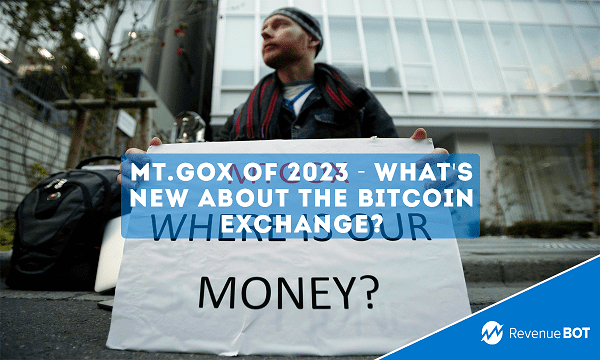
Mt.Gox is a name that will forever remain a byword for the early days of crypto trading. It used to be the world’s first bitcoin exchange, founded in 2010 by Jed McCaleb. It used to be the world’s first bitcoin exchange, founded in 2010 by Jed McCaleb. However, in 2014, it experienced the most dramatic hack in the history of crypto world, resulting in the loss of about 850,000 BTC.

Such an event caused a stir in the crypto community and significantly affected the value of Bitcoin. Throughout the years, there have raised questions about what happened to the lost bitcoins and whether the exchange will ever be able to refund its customers. So here’s a look at the latest news about Mt.Gox in 2023.
Background info
Mt.Gox stood as one of the greatest cryptocurrency exchanges in the world until its collapse in 2014. It was established in 2010 by Jed McCaleb, an American programmer and entrepreneur. McCaleb originally launched Mt.Gox as a cards trading platform for Magic: The Gathering game, but soon shifted his focus to bitcoin.
In 2011, McCaleb sold Mt.Gox to Mark Karpeles, a French software developer and entrepreneur who relocated the exchange from the United States to Japan. Under Karpeles’ leadership, Mt. Gox quickly grew to become the largest Bitcoin exchange in the world, and at its peak, it handled over 70% of all Bitcoin transactions globally.
Nonetheless, in February 2014, Mt.Gox halted all trading abruptly and filed for bankruptcy protection, citing the loss of 850,000 bitcoins, which were worth more than $450 million at the time. The collapse of Mt.Gox shook the cryptocurrency world and highlighted the risks and vulnerabilities of centralized exchanges.
Following the meltdown of Mt.Gox, an investigation revealed that the company had suffered years of mismanagement, security breaches and fraud. Karpeles was arrested and indicted for embezzlement and data manipulation, then spent more than a year in a Japanese prison before most of the charges were dropped.
Early hacker attacks
Mt.Gox fell victim to several high-profile hacking attacks that ultimately contributed to its collapse. In 2011, the first major attack occurred when hackers exploited a security breach in the Mt.Gox software in order to steal about 2,000 BTC from the exchange. This particular episode led to a temporary shutdown of the exchange, but Mt.Goxmanaged to recover and resume operations.
Later in 2013, Mt.Gox suffered a far more disastrous attack leading to the loss of about 850,000 bitcoins. At the time, such an amount was equal to $450m. The exchange ceased trading immediately and filed for bankruptcy.

Undetected for several years, the incident marked the largest bitcoin theft in history at the point, accounting for about 7% of all bitcoins in circulation.
A subsequent investigation into the hack revealed that the exchange operated with significant security flaws, while the missing bitcoins were likely stolen over several years. The company also admitted that it had suffered a loss of about 100,000 bitcoins from its customers.
The Mt.Gox team initially claimed the loss was the result of a technical issue known as a “incomplete transactions”, where a hacker could manipulate transaction data to create fake bitcoins. A follow-up investigation, however, indicated that the exchange appeared to be the victim of a far more traditional hacker attack, probably carried out by a sophisticated group of cybercriminals.
The consequences of the hack proved significant: the bitcoin price plummeted and Mt.Goxcustomers were left in limbo. During the months following the attack, Mt.Gox was forced to file for bankruptcy protection and was eventually liquidated.
How is Mt.Gox doing these days?
To date, only a small portion of the stolen BTC has been retrieved. In 2018, Japanese authorities seized about $2.3 billion worth of bitcoin and Bitcoin Cash from Mark Karpeles, who was found guilty of embezzlement and data manipulation. Still, the majority of the lost bitcoin remains untraceable.
What about the refunds to exchange customers?
As of 2019, the Mt.Gox trustee announced that it would distribute about $2 billion worth of bitcoin to creditors. The repayment process was originally supposed to begin in early 2020, but it was delayed due to the COVID-19 pandemic. According to the latest news, the actual start of the repayment process is now scheduled for Q3 2023.

The payment process would be painstakingly long and difficult, with many former clients waiting years for their compensation. The trustee has been criticized for his behavior on the matter, with some arguing that Mt.Gox’s payouts are unfair and favor large creditors over the small ones.
Conclusion
Mt.Gox was once a dominant force in the bitcoin trading world, but its collapse serves as a reminder of the risks associated with investing in crypto. While some of the stolen bitcoins have been recovered, the vast majority are still missing, leaving many former customers empty-handed. There are still ongoing settlements with the remaining creditors, and it is unclear whether they will ever be fully compensated.
The background of Mt.Gox is a cautionary tale for anyone interested in investing in cryptocurrencies. It is essential to do your due diligence and comprehend all possible risks before investing your money. Cryptocurrencies remain a relatively new and volatile asset type, with the Mt.Gox incident underscoring the need for proper security and regulatory measures to protect investors and prevent future hacks and thefts.
Because of the increased security and transparency of crypto exchanges and wallets, as well as stricter regulations in many countries, the crypto industry has made significant strides in recent years. Yet the Mt.Gox case serves as a stark reminder of the importance of vigilance and caution in the crypto market.
